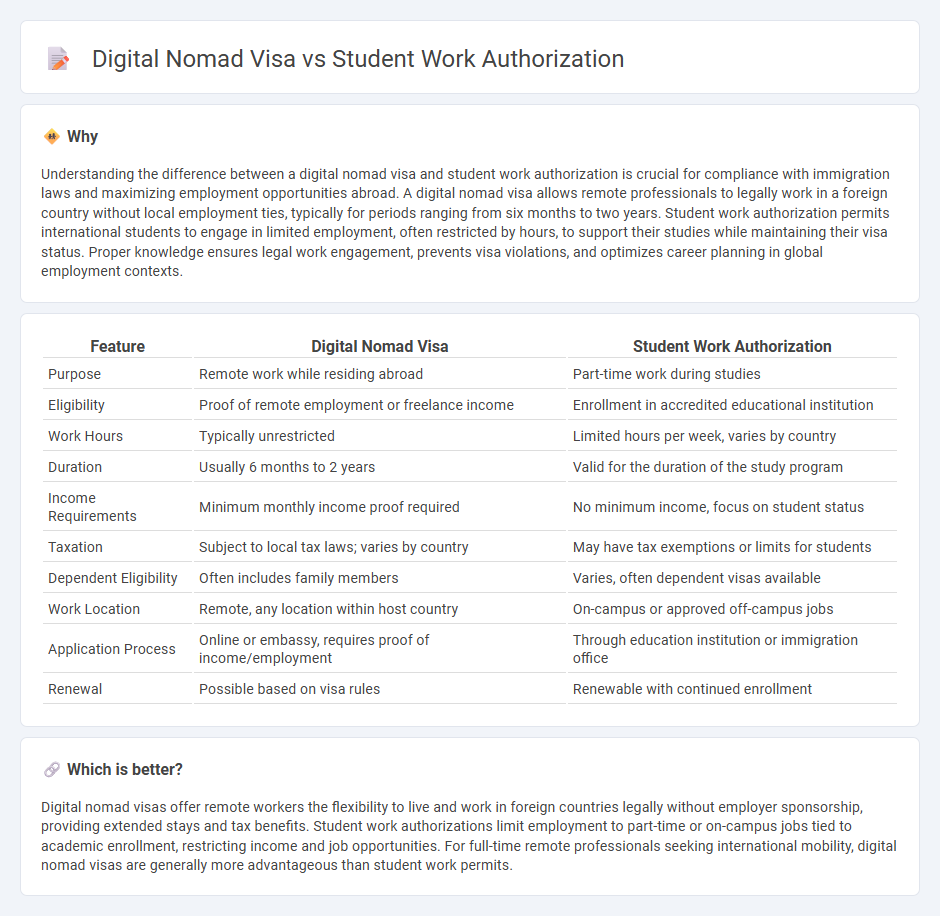
Digital nomad visas enable remote professionals to work legally while living abroad without traditional work permits, offering flexibility for location-independent careers. Student work authorization allows international students to engage in part-time or on-campus employment, supporting education-related expenses and gaining local experience. Explore the differences in eligibility, benefits, and limitations between these options to determine the best fit for your employment goals.
Why it is important
Understanding the difference between a digital nomad visa and student work authorization is crucial for compliance with immigration laws and maximizing employment opportunities abroad. A digital nomad visa allows remote professionals to legally work in a foreign country without local employment ties, typically for periods ranging from six months to two years. Student work authorization permits international students to engage in limited employment, often restricted by hours, to support their studies while maintaining their visa status. Proper knowledge ensures legal work engagement, prevents visa violations, and optimizes career planning in global employment contexts.
Comparison Table
| Feature | Digital Nomad Visa | Student Work Authorization |
|---|---|---|
| Purpose | Remote work while residing abroad | Part-time work during studies |
| Eligibility | Proof of remote employment or freelance income | Enrollment in accredited educational institution |
| Work Hours | Typically unrestricted | Limited hours per week, varies by country |
| Duration | Usually 6 months to 2 years | Valid for the duration of the study program |
| Income Requirements | Minimum monthly income proof required | No minimum income, focus on student status |
| Taxation | Subject to local tax laws; varies by country | May have tax exemptions or limits for students |
| Dependent Eligibility | Often includes family members | Varies, often dependent visas available |
| Work Location | Remote, any location within host country | On-campus or approved off-campus jobs |
| Application Process | Online or embassy, requires proof of income/employment | Through education institution or immigration office |
| Renewal | Possible based on visa rules | Renewable with continued enrollment |
Which is better?
Digital nomad visas offer remote workers the flexibility to live and work in foreign countries legally without employer sponsorship, providing extended stays and tax benefits. Student work authorizations limit employment to part-time or on-campus jobs tied to academic enrollment, restricting income and job opportunities. For full-time remote professionals seeking international mobility, digital nomad visas are generally more advantageous than student work permits.
Connection
Digital nomad visas and student work authorizations both provide flexible employment opportunities for individuals residing temporarily in a foreign country. These programs facilitate economic contribution by allowing visa holders to work remotely or part-time while studying, benefiting local economies through diverse labor participation. Integration of digital nomad visa policies with student work permits supports global mobility and skill development in international employment markets.
Key Terms
Work Permit
A student work authorization typically allows international students to work part-time during their studies, often limited to on-campus jobs or specific hours per week, ensuring compliance with visa regulations. Digital nomad visas grant full work permits for remote professionals to legally work for foreign employers while residing temporarily in a host country, often without restrictions on working hours. Explore the detailed differences in work permit eligibility and restrictions to choose the best fit for your career goals.
Remote Work Eligibility
Student work authorization typically permits on-campus employment and limited off-campus work related to studies, with strict hours and eligibility criteria set by immigration laws. Digital nomad visas offer broader remote work eligibility, allowing professionals to work for foreign employers or maintain freelancing activities while residing in a host country without typical work permit restrictions. Explore detailed comparisons of remote work eligibility and compliance requirements to choose the best visa option.
Visa Sponsorship
Student work authorization typically requires enrollment in an accredited institution, with visa sponsorship tied to the educational entity, limiting employment to on-campus jobs or approved internships. Digital nomad visas generally do not require employer sponsorship, allowing foreign nationals to work remotely for companies outside the host country without traditional visa sponsorship constraints. Explore the differences in visa sponsorship requirements to determine which option best suits your international work and study plans.
Source and External Links
working on an F1 visa - International Student Loan - F-1 visa students in the US can work with strict guidelines including on-campus employment and authorized off-campus options like CPT, OPT, and severe economic hardship employment, all requiring specific approvals and conditions related to their studies.
Working in the United States - Study in the States - Homeland Security - F-1 students have limited authorized work options including on-campus jobs and authorized off-campus employment requiring application and approval through their Designated School Official (DSO) and USCIS, with strict enforcement against unauthorized work.
Students and Employment - USCIS - F-1 students cannot work off-campus during their first academic year but may engage later in CPT, OPT, or STEM OPT extension, with all employment tied to their field of study and requiring prior USCIS authorization via their DSO.
 dowidth.com
dowidth.com